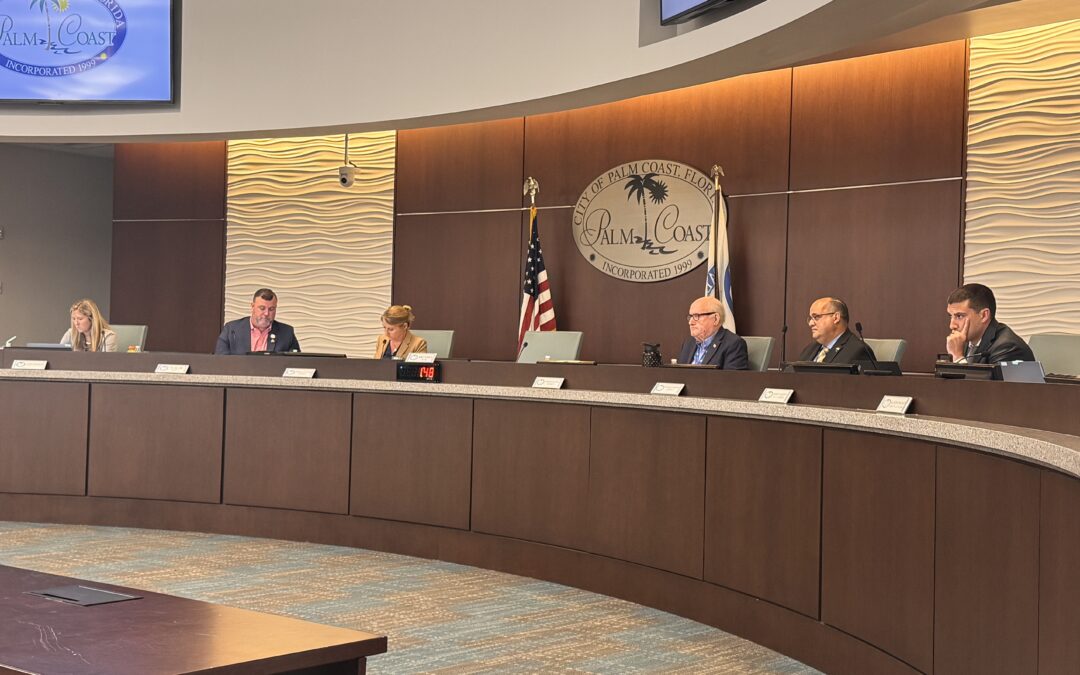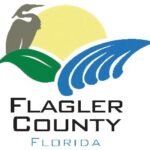The Palm Coast City Council convened for a lengthy business meeting on July 15, 2025, addressing numerous agenda items, including budget concerns, development approvals, and ongoing tensions between council members that culminated in a censure motion.
Public Participation Highlights Water Bills and Code Enforcement
The meeting began with extensive public participation, where residents voiced concerns about various city issues. Multiple speakers addressed high water bills, with one resident stating she received a bill for over $700 due to an undetected toilet leak. “I used watering for the grass, but I also had a leak on the toilet, 40 gallons a day, and I didn’t get a warning,” said Chantelle Prenninger. “I wish I had gotten a warning because that was a high bill.”
City Manager Lauren Johnston responded that the city attempts to notify customers about high usage but noted that not all meters have the advanced metering infrastructure necessary for such notifications, and high call volumes sometimes prevent timely warnings.
Code enforcement emerged as another significant concern. Mark Stancel from Seminole Woods argued for comprehensive reform, stating, “A lot of this is a buildup of over time of a lack of the proper code enforcement policies. They need to be reformed and updated to fit the city that we live in today.” He suggested that many current violations could have been prevented with consistent enforcement over the years.
Residents also discussed short-term rental regulations, with Sherry Montgomery requesting transparency about current enforcement efforts. She noted there are 14 short-term rentals within three-quarters of a mile of her home and asked for clear updates on regulation development and compliance.
Charter Review Committee Appointments
The council successfully appointed members to the Charter Review Committee, with each council member selecting one primary member and one alternate from 27 applicants. Mayor Norris expressed satisfaction with the response, saying, “We got 27 people to apply. That’s pretty good. Because everybody’s busy and everybody’s got their lives to live. But I appreciate it.”
The primary appointments included Ramon Marrero (Councilman Gambaro), Donald O’Brien (Councilman Sullivan), Perry Matrano (Vice Mayor Pontieri), Michael Martin (Councilman Miller), and Patrick Miller (Mayor Norris). Alternates were also selected for each district.
Development and Land Use Decisions
The council approved the first reading of an ordinance establishing the Lighthouse Community Development District, a 67-acre mixed-use development that will include 785 residential units, retail space, and boat storage. Senior Planner Phong Nguyen explained that the Community Development District is “a funding mechanism for providing the infrastructure to develop” the project, noting that “the city is not a party to the financing and does not incur any obligation for the infrastructure debt.”
The council also approved land exchange zoning amendments related to Fire Station 26, cleaning up zoning classifications following a previous land swap agreement. This involved changing designations from institutional to mixed-use and from public, semi-public to light industrial warehousing.
Budget Discussions and Millage Rate
The council addressed the fiscal year 2026 budget, with staff presenting a proposed maximum millage rate of 4.1893, the same as the previous year. Budget Director Helena Alves and Financial Manager Gwen Ragsdale provided detailed presentations showing the general fund budget of $68.8 million, an increase of $7.6 million from the previous year.
Vice Mayor Theresa Pontieri advocated for a tenth of a mill rollback, stating, “My position is going to be that we should do a tenth of a mill rollback even for the max. And I hope I can get support from the Council on that.” However, the council ultimately approved maintaining the same maximum millage rate, with Pontieri casting the lone dissenting vote.
Councilman Sullivan supported the decision, saying, “I think holding the millage rate max the same as last year gives us the most flexibility as a council as far as what should be deleted or added or subtracted.”
Utility Infrastructure Investments
The council approved significant utility infrastructure expenditures, including a $1.176 million pre-construction services agreement with Wharton Smith for the Wastewater Treatment Plant 1 expansion project. Carl Cote, Director of Stormwater Engineering, explained that the project will expand capacity to 4 million gallons per day.
A controversial $7.4 million approval for the Oak King South Utility Improvements Project generated debate, particularly regarding a $6 million addition for reclaimed water infrastructure. Councilman Miller expressed reservations, stating, “It wasn’t included in the original agreement is my main pause. So we’re just tacking on something, and it’s not a little bit of money, it’s six million dollars.”
City officials defended the addition, with Cote explaining that the reclaimed water system is necessary for future wastewater treatment plant operations and provides environmental benefits by reducing potable water usage for irrigation.
Animal Memorial and Housing Assistance
In lighter matters, the council approved a memorandum of understanding with Saving Missing Animals Response Team (SMART) to create a Rainbow Bridge pet memorial at James F. Holland Memorial Park. Caroline from SMART explained, “Having a memorial space is important, not just for our family-owned pets, but for the ones we cannot save as well.”
The council also supported Flagler County’s Local Housing Assistance Plan for the State Housing Initiative Partnership Program. The plan focuses on providing housing assistance to very low to moderate-income households and includes strategies for first-time homebuyers and essential services employees.
House Color Controversy Revisited
One of the most contentious discussions involved reconsidering previous decisions about house color restrictions. Vice Mayor Pontieri moved to reconsider the council’s earlier decision to eliminate all color restrictions, arguing that “reasonable regulation to make sure that our city remains beautiful” should be maintained.
The debate highlighted tensions between property rights and community standards. Public speaker Jeani Duarte strongly opposed restrictions, asking, “Who are you to tell anybody what color to change to make their house?” She argued that forcing residents to repaint would be financially irresponsible during difficult economic times.
Conversely, other speakers supported some restrictions to maintain neighborhood character. The council ultimately voted to reconsider the issue and settled on removing Light Reflectance Value restrictions while maintaining bans on specific colors like fluorescent and neon shades.
Ethics and Legal Disputes
The meeting’s most dramatic moments centered on ongoing disputes regarding a lawsuit filed by Mayor Norris challenging the appointment of Councilman Gambaro to his seat. Vice Mayor Pontieri presented detailed information suggesting the mayor had received legal advice against filing the lawsuit but proceeded anyway, potentially costing taxpayers money in legal fees.
Attorney Jeremiah Blocker’s written memorandum, referenced during the meeting, detailed multiple occasions when he advised Mayor Norris that a lawsuit would be “frivolous and without standing” and that “the charter was correctly interpreted” regarding the appointment.
The tension escalated when Councilman Gambaro referenced a Facebook post by the mayor that included his phone number, calling it “unsafe behavior.” Gambaro stated, “Mayor Norris, sir, you have crossed the line. We can no longer sit by and allow your toxic behavior and your actions of fear and intimidation to continue.”
Mayor Norris defended his actions, explaining he corrected the post when he realized it contained a personal rather than city phone number, and denied attacking Gambaro’s military service. “I never say anything about your military service,” Norris stated. “You’re making it personal, Charlie, not me.”
Censure Motion and Council Dynamics
The meeting concluded with Councilman Gambaro moving to censure Mayor Norris and requesting council members join in writing to the governor for his removal. The motion cited what Gambaro described as a “pattern of toxic behavior exhibited through fear and intimidation.”
Public speakers had mixed reactions to the proceedings. Georgianne Miller urged the council to move forward, saying, “You need to work together for this city. And all of this wasting our money, pissing at each other, and just doing this should have never been seconded.” However, Jeani Duarte supported the mayor, stating, “If anyone should be removed, it’s gonna be you [Gambaro].”
Vice Mayor Pontieri expressed reluctance about requesting the governor’s intervention, explaining, “Mayor Norris was elected and we have to think about the residents that did elect him, regardless of how they feel now.” However, she ultimately voted in favor of the censure motion, which passed 4-1.
Meeting Conclusion
The council meeting, which lasted several hours, demonstrated the ongoing challenges facing Palm Coast’s government as it balances growth management, fiscal responsibility, and internal governance issues. While routine business continued with various approvals for infrastructure, development, and community programs, the interpersonal conflicts among elected officials remained a significant distraction from municipal operations.
The meeting ended with routine administrative matters, including reports on emergency purchases and a cancellation of the evening’s food truck event due to weather concerns. The next scheduled meeting will include continued budget discussions and consideration of the various first-reading items approved during this session.









